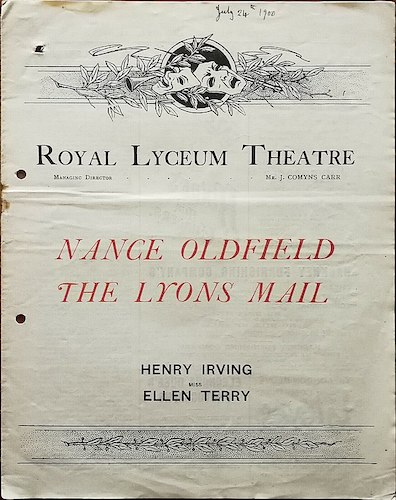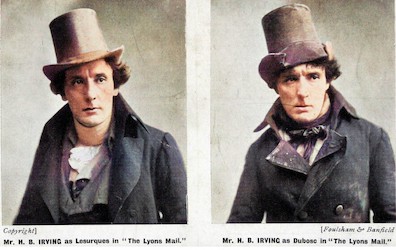As the constables arrest Bloom in Circe, he claims
that he has been confused with someone else: "Mistaken
identity. The Lyons mail. Lesurques and Dubosc. You
remember the Childs fratricide case. We medical men. By
striking him dead with a hatchet. I am wrongfully accused.
Better one guilty escape than ninety-nine wrongfully
condemned." Life here imitates art, which imitates life: a
play performed in London in the late 1870s presented
the real-life story of a French man who was wrongfully accused
of a crime, condemned, and executed. And Bloom's protestation
closely echoes Stephen's paranoia in Proteus.
In 1854 Charles Reade adapted The Courier of Lyons
from an 1850 French original, and in 1877 he rewrote it as The
Lyons Mail for performance by Henry Irving at London's
Lyceum Theatre. All three plays tell the story of Joseph
Lesurques, who was one of six men arrested in 1796 for the
ambush robbery of a mail coach leaving Paris for Lyons, a
major heist that resulted in the murder of the driver and the
armed guard. Three of the six men, including Lesurques, were
guillotined after the trial, despite the testimony of one of
the robbers, Étienne Couriol, that Lesurques had been
misidentified because he closely resembled one of the actual
accomplices, André Dubosq. Couriol's testimony resulted in the
arrest, trial, and execution of Dubosq as well as three more
accomplices.
Despite the conviction of Dubosq, Lesurques was never
exonerated by the government and his case became a famous
example of miscarriage of justice in France, inspiring the
1850 play and a 1937 film. Reade's adaptation made the story
famous in English-speaking countries as well: a silent film
re-told the story in 1916, and a talkie came out in 1931. In
the London stage production, Henry Irving's performance of the
parts of both Lesurques and Dubosc (the spelling in the play)
was widely acclaimed.
As Bloom reminds the constables, the French story chimes with
the Childs murder case, in which the brother of a murdered
Dubliner was acquitted because of doubt about the testimony of
a witness who identified him as having been present at the
scene. It also makes for one more uncanny link with Stephen Dedalus,
who in Proteus recalls having attended a play in
order to secure an alibi against being accused of murder—on a
date, 17 February 1904, on which an Irish newspaper reported
on an English adaptation of a French play about a man
wrongfully accused of murder. At this point the entanglements
of art and life, Stephen and Bloom, Paris and London and
Dublin, become almost too intricate to follow.

